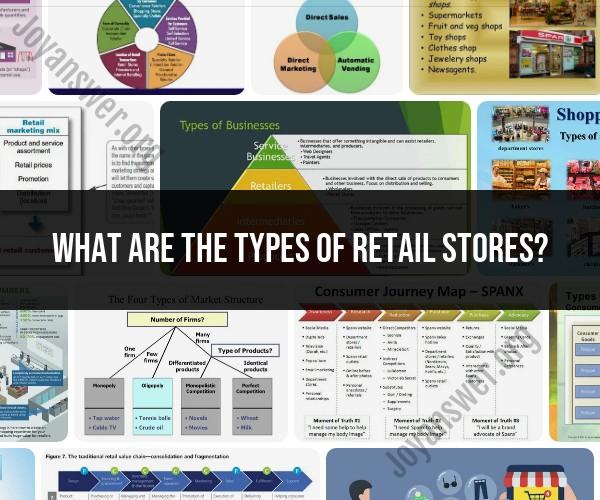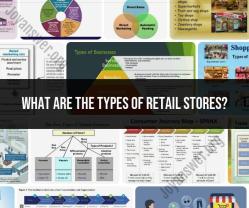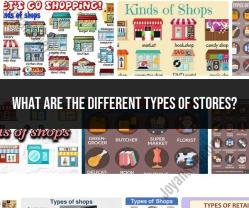What are the types of retail stores?
Retail stores come in various types, each offering unique shopping experiences and catering to different consumer needs and preferences. Here are some common types of retail stores:
Department Stores: Department stores are large retail establishments that offer a wide range of products across various categories, including clothing, electronics, home goods, cosmetics, and more. They often have multiple departments and offer both high-end and budget-friendly options. Examples include Macy's and Nordstrom.
Discount Stores: Discount stores, also known as discount retailers or mass merchandisers, focus on providing products at lower prices. They often carry a wide variety of goods, including clothing, household items, and groceries. Examples include Walmart and Target.
Specialty Stores: Specialty stores focus on a specific product category or niche market. They offer a curated selection of items within that category. Examples include Apple Stores (electronics), Sephora (cosmetics), and GameStop (video games).
Boutiques: Boutiques are small, often independently owned retail shops that offer unique and curated selections of clothing, accessories, or other specialty items. They are known for personalized service and a distinct shopping atmosphere.
Outlet Stores: Outlet stores sell discounted or overstocked products from brands and retailers. Shoppers can find deals on items that are typically sold at higher prices in regular stores.
Grocery Stores: Grocery stores specialize in selling food and household items. They range from full-service supermarkets to smaller neighborhood markets and include specialty grocery stores like health food stores and ethnic markets.
Convenience Stores: Convenience stores, also known as "c-stores," are small shops that offer a limited selection of convenience items, such as snacks, beverages, and basic household necessities. They are known for their extended operating hours.
Warehouse Clubs: Warehouse clubs require membership and sell products in bulk quantities. They offer a wide range of goods, including groceries, electronics, and household items. Examples include Costco and Sam's Club.
Pharmacies: Pharmacies primarily focus on selling prescription medications and healthcare products. Many pharmacies also offer a selection of over-the-counter medications, personal care items, and convenience products.
Online Retailers: Online retailers operate exclusively on the internet and sell a wide variety of products, from electronics and clothing to books and groceries. Examples include Amazon, eBay, and Alibaba.
Pop-Up Shops: Pop-up shops are temporary retail spaces that appear for a limited time, often to promote a specific product or brand. They can be found in malls, empty storefronts, or at events.
Secondhand and Thrift Stores: Secondhand stores, also known as thrift stores or consignment shops, sell used items at lower prices. They are popular for finding unique and budget-friendly clothing, furniture, and more.
Malls and Shopping Centers: Malls and shopping centers are large complexes that house multiple retail stores, restaurants, and entertainment options under one roof. They offer a diverse shopping experience.
Home Improvement Stores: Home improvement stores specialize in products for home improvement and renovation projects. They offer items like building materials, tools, appliances, and home décor. Examples include Home Depot and Lowe's.
Pet Stores: Pet stores sell pet-related products, including pet food, accessories, and sometimes live animals like fish, birds, or small mammals.
Furniture Stores: Furniture stores specialize in selling furniture and home furnishings, including sofas, tables, beds, and decor items.
Electronic and Appliance Stores: These stores focus on electronics and appliances, including televisions, refrigerators, washing machines, and small kitchen appliances.
Art and Craft Stores: Art and craft stores provide supplies and materials for artists, crafters, and hobbyists. They often offer a wide range of creative products.
Jewelry Stores: Jewelry stores sell a variety of jewelry items, including rings, necklaces, bracelets, and watches. Some specialize in high-end jewelry, while others offer costume jewelry.
Antique Stores: Antique stores sell vintage and collectible items, including furniture, artwork, and decorative pieces from past eras.
These are just some of the many types of retail stores that cater to different consumer needs and preferences. The retail industry continues to evolve, with new store concepts and formats emerging to meet changing consumer demands.









